Term 2 Unit 1 | Civics | 6th Social Science - National Symbols | 6th Social Science : Civics : Term 2 Unit 1 : National Symbols
Chapter: 6th Social Science : Civics : Term 2 Unit 1 : National Symbols
National Symbols
CIVICS
Unit 1
NATIONAL SYMBOLS
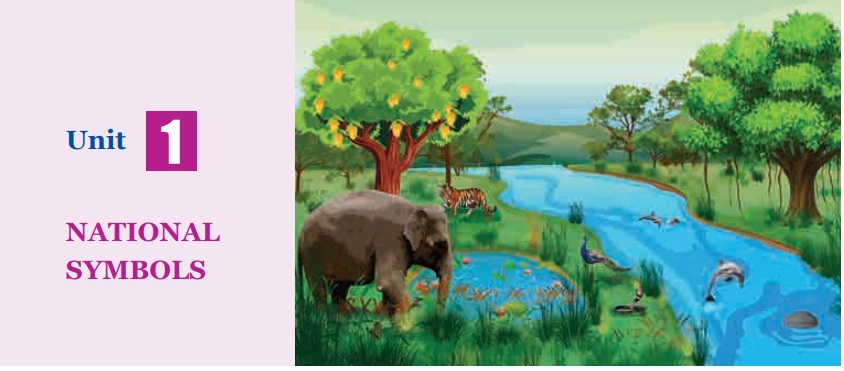
Learning Objectives
• To know about the
natural national symbols of India.
• To understand the
importance to protect nature.
• To know the other
national symbols and appreciate them.
• To know the about
different national festivals and celebrate them with joy.
Path way
This lesson deals with
the natural national symbols and the other national symbols. It also explains
about the different national festivals.
Velan
and Ponni went on a forest trip to Pulivanam. The thought that they were going
to visit the forest, made them ecstatic and they were filled with excitement
and adventurous spirit. Veena, a wildlife reasearcher was with them. That
forest had a legendary river running across. The forest also had 2,000 metre high
mountain.
As
per the plan,
they had reached
the forest area by a vehicle. “We are waiting for you” said the forest officer
Manimaran, smilingly to the enthusiastic young researchers. Veena introduced Velan and Ponni to the officer. The
personal vehicles had to be stopped there as they were restricted to go
further. After that they had to travel only by vehicles run on battaries that
are pollution free. These vehicles also called as ‘Jeep’ were covered with
glass. A jeep was waiting for them. The forest officer Manimaran, Veena and the
team boarded the vehicle.
“I think
you are eagerly waiting to watch the tiger, but it is possible only when you
are lucky enough. Though it is the tiger’s habitat, there are many birds,
insects, reptiles, aquatic life and
amphibians which make the eco-system. So
please don’t wait only for the tigers but enjoy watching other animals too. And
remember you shouldn’t speak loudly” said Manimaran.
In a few minutes they had a chance to
see a beautiful pond with lotus. The vehicle was moving slowly. The lotuses
were smiling back at them. “Lotuses are of different types. Those which are
pink are called pink lotuses. The lotus has a very special structure” said
Veena.
Just behind a big tree near the pond, a
peacock was fanning out its feathers gracefully. Without making noise, Velan and
Ponni were admiring it. “Uncle Manimaran, usually peacocks do this during rainy
days. Will it rain now?” said Ponni.
“Maybe. It dances only during rainy
days. But once a chieftain Began, wondered whether the peacock was shivering in
cold and covered the peacock with his shawl. This chieftain belonged to the
classical Sangam age of Tamils and also revered as one of the seven most
generous personalities of ancient Tamil land.
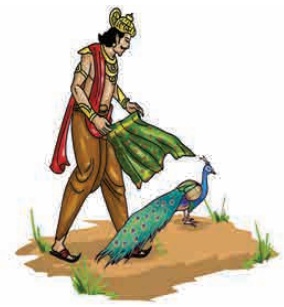
There is a Peacock
Sanctuary at Viralimalai in the district of Pudukottai (Tamilnadu)
“You know very well that the peacock is
our national bird. For a long time the Peacock has a significant place in our
culture, art and heritage. It’s beauty, stately appearance and its even
distribution all over India makes it our national bird” said Manimaran.
The vehicle moved forward silently.
They admired the beauty on either side even without blinking.
“We have come very close to the bank of
the river. Now we have to go along the river. I am going to show you a
different animal. You have to remain silent; only then you can see it. Please
take your binoculars” said Manimaran.
Veena had instructed the team to bring
their binoculars on the visit. Velan and Ponni had borrowed the binoculars from
their neighbours. They focused their binoculars towards the gap between the
bushes. That gave them a view of the river. Veena said, “Look, there is
something black like a Gharial crocodile moving”. They could not see the animal
clearly due to the glare caused by the morning sun. Manimaran said, “Turn away
from the Sun’s rays and watch carefully. It is not a Gharial”.
Veena said, “No it does not look like a fish. It looks
like an aquatic mammal – a river dophin”.
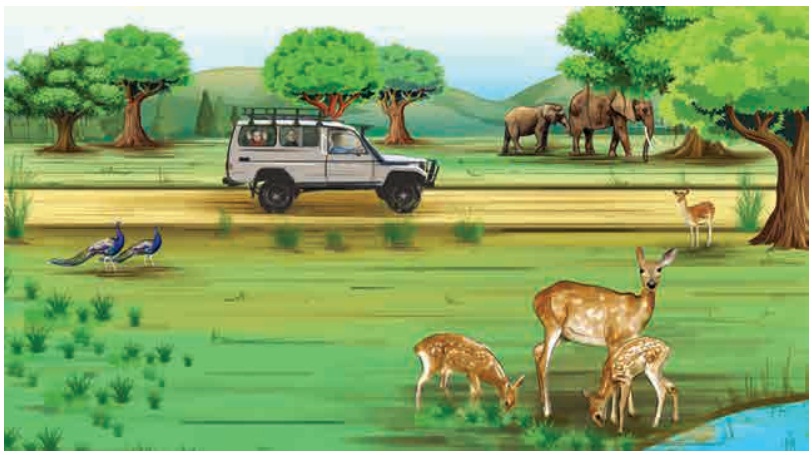
Velan and Ponni exclaimed, “What? Is it
a dolphin? Marine acrobatic animal? How can it live in a river?
Manimaran said, “There are river
dolphins in our country. The dolphins that live in the rivers have a long snout
similar to the Gharial crocodiles. Just like bats, they use the ultrasound
waves to catch their prey. They are essentially blind.
Velan said, “That was an interesting
detail”.
“Do you know the name of the river
beside which we are now on?”.
“The rich harvests of the fertile
plains of Ganges was mentioned in one of Bharathiyar’s famous songs. Am I on
the same banks of Ganges? My father asked me to collect some information about
this place before visiting it,” said Ponni.
“No doubt about it.”
“Do you know that this river is 2,525
km long and is the longest river in India?” said Velan stunning everyone
around.
“Though Brahmaputra is 3848 km long, it
does not flow across India. So, What Velan said is right” said Veena.
Manimaran said, “We have seen a lot of
things. Now let us relax. Come, let us have these pieces of mangoes.”
“These mangoes are very tasty, what
kind of mangoes are these?” asked Veena eagerly.
“This kind of mango is known as ‘Imam
pasand’ a variety of mango that was cultivated during the Mughal reign for the
royal family. This is occasionally found in the forest. Even this was picked
from the mango grove at the fringes of this forest” said Manimaran. Eveyone got
into the vehicle and were ready to go.
“Now we are going to see another
wonder” said Manimaran and drove the vehicle around a big banyan tree with
countless roots around. He travelled around it for a few minutes and came back
to the starting point. “Such a big banyan tree?” exclaimed Ponni and Velan.
“This is a very big banyan tree and is
the oldest in this forest. It is the habitat of thousands of birds. It is as
famous as the banyan tree in the Indian Botanical Garden in Howrah (Calcutta),”
said Manimaran.
“There is another big banyan in Adyar
(Chennai). It is as big as that. I saw that when I visited the Theosophical
Society and wondered at it.” said Ponni.
“Let us now go slowly because there is
a herd of elephants climbing the mountains right behind the banyan tree” said
Manimaran.
Velan replied at once, “Oh! Aren’t the
wild elephants ferocious? Are we in danger?”.
Manimaran said “First and foremost we
are not supposed to trouble the wild animals because the forest is their home.
We can admire them without disturbing them.”
Manimaran continued “We should know how
to safeguard ourselves from the encounters of the wild animals. That is the reason
why we try to explore the forests with the guides who belong to the forest
tribal community”.
“Even though the animals are quite
huge, they will not harm you unless you hurt them”.
“Let us also climb the hills along with
the elephants. There is another surprise waiting for you on the top of the
hills” said Manimaran.
After climbing the hill they came
across a plain. He parked the vehicle and asked the team to see something using
their binoculars. “Look there,”
There was a cone-shaped nest built with
dried leaves. Manimaran asked, “Can you guess which animal’s nest is that?
I know that birds build nests on the
ground, but this seems a bit strange,” said Veena.
It is a snake’s nest, the nest of king
cobra”.
“What? Snakes build nests?” said Velan.
“This is the only reptile that builds a
nest of its own and reproduces. Thus snake’s average length is 18 feet and is
the longest of the poisonous snakes” said Manimaran.
“We have explored the forest and
climbed the hills but we have not seen a tiger till now” said Ponni.
“Don’t worry Ponni. We have come across
many wonders. The Tiger is a very shy animal. While descending down the hills
we may see one on the rocky area on the slope” said Manimaran.
They had seen many unusual things that
day. But they were very disappointed because they had not seen ever a tiger.”
“I have visited several forests but
they are not identical. I got some new information from Mr.Manimaran and the
tribals. I have visited forestes many times regarding my research. But I was
not able to see the tiger. Don’t worry, we will see a tiger some time later
comforted Veena.
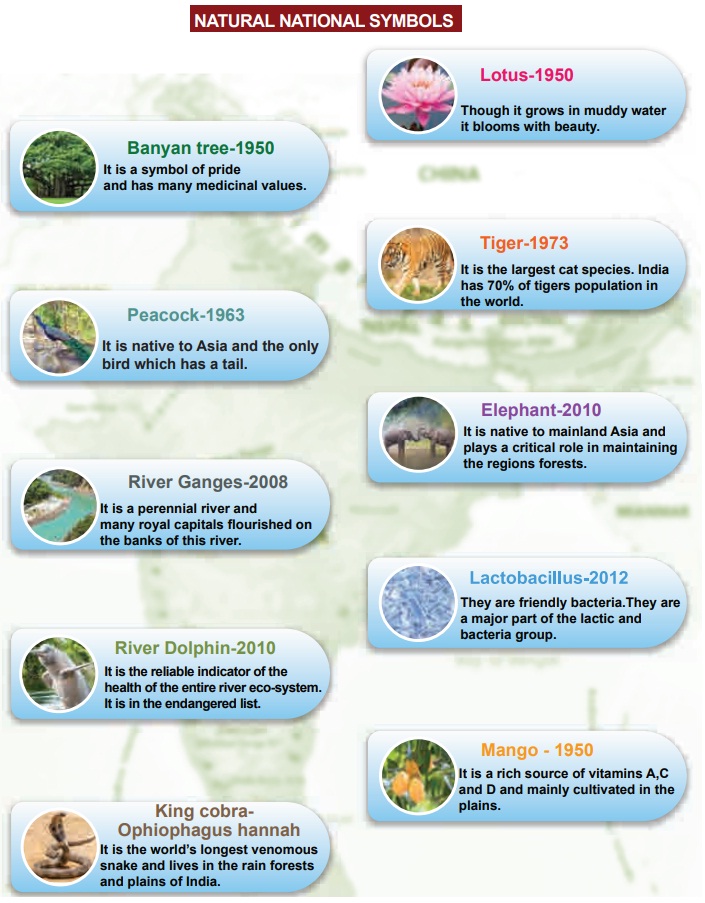
They descended down the hill and came
to the same place where they had watched the river dolphins. They parked the
vehicle and rested for a while. Ponni came out of the vehicle and watched
through the binoculars. She noticed something strange. She couldn’t control
herself she whispered “Uncle, look there.” All of them quickly turned to look
with their binoculars. They saw a tigress with her three cubs drinking water
from the river. Veena captured the beautiful scene with her camera. Nobody
dared to see anything other than the tigress, till it left the river bank and
vanished away.
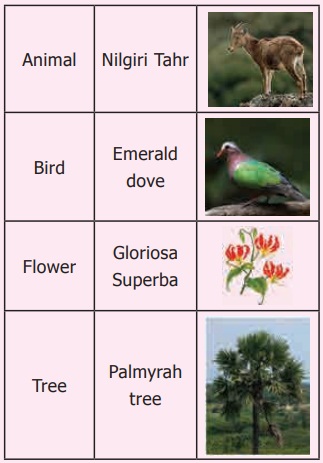
“This is the real king of the forest” said Manimaran.
“It is absolutely true” said Veena.
They all got back to the vehicle and
were returning. Veena asked the team a question. “Do you know, there is
something common between all the wonders you have seen today?”
“What is common?” asked Velan.
“Please, tell us quickly. We are very
eager to know” said Ponni.
“All that we saw today are our natural
national symbols” said Veena
“You are right, Veena. This didn’t
strike me.” said Manimaran.
Related Topics